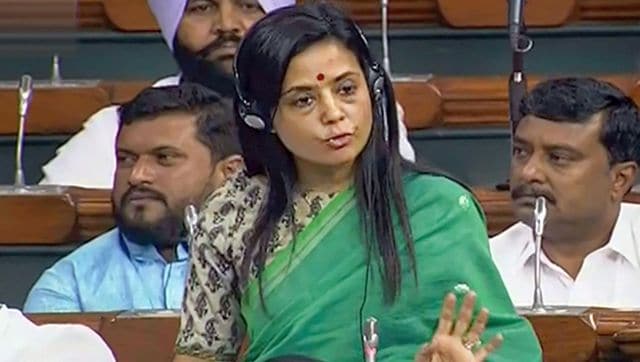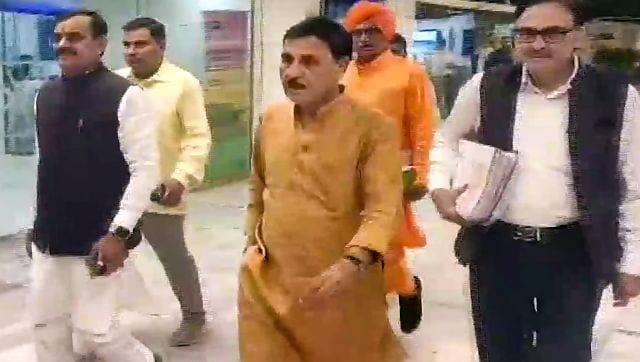
“Pre-fixed match”, “a kangaroo court”, “death of parliamentary democracy”.
These were the words used by Trinamool Congress (TMC) MP Mahua Moitra after the Lok Sabha Ethics Committee approved the recommendation of her expulsion from Parliament in the cash-for-query scam. The report was approved in a split verdict, with Ethics Committee chairman Vinod Sonkar saying that six members voted in favour and four members were against the recommendation of Moitra’s expulsion from Lok Sabha.
The four members of the committee, who rejected the report, said in their dissent notes that the panel conducted its probe in “unseemly haste” and with “complete lack of propriety”.
The firebrand MP too rejected the findings of the report, telling news agency PTI, “Even if they expel me in this Lok Sabha, I will be back in the next Lok Sabha with a bigger mandate.
“This is a pre-fixed match by a kangaroo court, which is of no surprise or consequence. But the larger message is that for India, it is death of parliamentary democracy,” Moitra said.
But what does this report actually mean for Moitra? Is she immediately expelled from the Lok Sabha?
Here’s what we know.
What the report said about Moitra
The future of Mahua Moitra is uncertain as of now as she now awaits the next steps in this cash-for-query-scam. However, it all stems back to the allegations made against her by BJP MP Nishikant Dubey and Supreme Court lawyer Jai Anant Dehadrai, who had alleged that Moitra accepted cash and gifts from businessman Darshan Hiranandani as bribes for asking questions in the Lok Sabha.
Also read: ‘Jilted ex’, politicians and businessman: The men TMC’s Mahua Moitra is up against
While Moitra has vehemently denied the charges, the matter was taken up by the Lok Sabha Ethics Committee, who conducted a hearing on 2 November, during which Moitra walked out, alleging that the chairman, BJP’s Vinod Sonkar, had asked her “personal and unethical questions” and subjected her to a “proverbial vastraharan” (stripping).
Following that on 9 November, the panel met once again and it was here that the members in a split verdict recommended for her expulsion. The report condemned Moitra for “unethical conduct” and “contempt of the House” for sharing her Lok Sabha log-in credentials with Hiranandani.
The panel recommended “severe punishment”, urging the Government of India to conduct an “intense, legal, institutional inquiry” in a “time bound manner”.
However, dissenting members in the panel argued that Moitra had not been given a fair chance to defend herself. The dissent note, as per an Indian Express report, said Moitra was not given the opportunity to cross-examine businessman Darshan Hiranandani, with whom she is accused of sharing her Parliament login and password.
“The alleged bribe-giver Mr Hiranandani is a key player in this case, having given a vague ‘suo motu’ affidavit with no details. Without the oral evidence and cross-examination of Mr Hiranandani as demanded by Ms Moitra in writing and indeed as demanded by the law of a fair hearing, this enquiry process is a farce and a proverbial ‘kangaroo court’,” the dissent notes said.
One of the notes said the recommendation of the panel for her expulsion was erroneous and was framed “purely for political reasons”.

Moitra speaks
Moitra remained defiant even after the news broke that the panel had recommended her expulsion from the House.
She termed the procedures of the Ethics Committee akin to a kangaroo court and criticised the panel for breaching its mandate.
“From day one, it was a kangaroo court. There is no evidence, no trial, nothing. They called me for questioning, which was not complete because the chairperson did not allow others to question me,” she said.
Additionally, Moitra said, “The mandate of the panel cannot go to expulsion.”
“If indeed it was a serious matter of cash for a query, that is an issue of a breach of privilege and should have gone to the privilege committee. The Ethics Committee’s mandate is to look into unethical conduct. This is a typical hatchet job. Last night, it was leaked to the media,” she said.
She further pointed out that there was no evidence found against her. “They have said they have not found any evidence. So if you don’t have any evidence, then on what ground are you expelling me or recommending my expulsion? This only shows their true intention,” she said.

The next steps
As per the rules of the Ethics Committee — incorporated in Chapter XXA of the Rules of Procedure and Conduct of Business in the Lok Sabha in August 2015 – the recommendations of the Committee in the form of a report shall now be presented to the Speaker who will table it in the House.
According to Rule 316E, after the report has been presented, the Chairperson or any member of the Committee or any other member may move that the report be taken into consideration whereupon the Speaker may put the question to the House.
The rules further state that the Speaker may allow for a debate on the matter not exceeding half hour.
Once a debate is carried out, the government may move a motion for voting on member’s expulsion. If voted in favour, the member will be expelled from the House.
However, according to the Economic Times, Moitra can challenge that decision in the court of law.
Notably, this is the first instance when the Lok Sabha Ethics Committee, which came up two years ago and normally hears complaints largely of a light nature, has recommended the expulsion of an MP. In 2005, 11 MPs were expelled from Parliament in another cash-for-query case but those expulsions were recommended by the Rajya Sabha Ethics Committee and a Lok Sabha Inquiry Committee.
New rules in the offing
According a report by the Hindustan Times, the incident has also prompted the Ethics Committee to ask Speaker Om Birla to frame a set of rules to check unruly conduct of MPs.
Noting that Parliament has seen many instances of unruly conduct, the Ethics Committee believes that the current rules are ineffective in stopping such behaviour. “The committee wish to appeal to the Hon’ble Speaker, who is the custodian of the House, to consider framing a new set of rules which may stand as a firewall to contain the unruly conduct/behaviour of such members of Parliament,” the committee has recommended in its draft report, according to Hindustan Times.
With inputs from agencies
